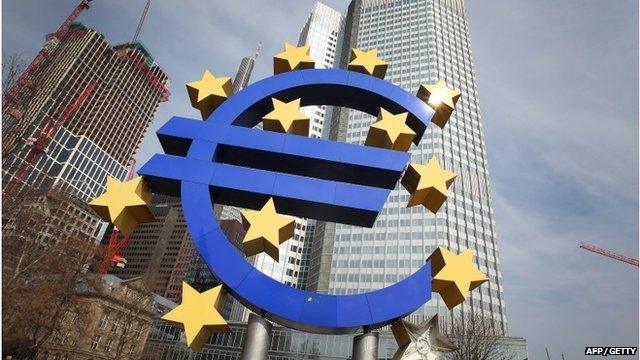Is the eurozone saved?
- Published
- comments

Are the euro area's financial woes history?
With Portugal joining Ireland and Spain in announcing that it no longer needs a bailout from the International Monetary Fund and the eurozone's rescue mechanisms, the question arises whether the euro area's financial woes are history.
Is the euro-area now sound as a pound (so sorry for the inappropriate metaphor)?
Well if you are a risk-loving canny investor, it has been a wonderful few months to be buying the debts of financially stretched euro-governments.
According to Bloomberg data, buyers of Spanish bonds would have made a 10% profit over the past year and holders of Portuguese government bonds would have made a 17% return.
The best investment of all were the bonds of the financially mullered Greek government, which has delivered a lip-smackingly tasty 55% profit over 12 months.
Which means that the implied cost for the Portuguese government of what it has to pay to borrow (the yield on its bonds) is almost as low as at any time in its history - and the interest rate that investors demand that the more financial stretched euro governments in general pay to borrow is remarkably close to what they charge mighty, solid Germany.
Or to put it another way, the institutional investors and hedge funds which three years ago were dumping eurozone assets as though they were infected with plague currently think the risk of Portugal, or Spain or Ireland going bust, or of the eurozone falling apart, is de minimis.
So everything must be tickety boo in Euroland again, surely.
Well not for the almost 12% of eurozone citizens who are unemployed, given that - according to the OECD's new forecast - that rate is set to fall only marginally in the coming 18 months, to a still-high 11.4% in 2015 (and in Spain the unemployment rate is almost 26%).
What still appears seriously wrong in the euro area is that meaningful economic growth remains elusive.
The OECD today forecasts growth of GDP or output in the eurozone of just 1.2% in the current year - which compares with a forecast of 2.6% for the US and could turn out to be a third of the rate at which the UK economy may grow this year.
And even by 2015, the OECD expects the euro area to be growing at just 1.7%, more than two percentage points less than the speed at which it expects the global economy to expand.
Here is the point: thanks mainly to the European Central Bank's repeated promises to take (largely unspecified) measures to prevent eurozone Armageddon, there is a good deal more financial stability in the eurozone, but that stability should not be taken for granted.
The immediate risk is of considerable political turmoil. All over the eurozone (and in the UK too, of course), the sense among citizens that their leaders are not delivering prosperity has seen a dramatic rise in the popularity of Eurosceptic parties of left and right.
We will know the magnitude and significance of that advance when we get the results of elections for the EU parliament later this month.
But if the eurozone's electorate becomes yet more disenchanted with the region's integrationist elite, it will become much harder for the currency union to adopt reforms widely regarded as necessary to stave off future disaster.
There has been plenty of hardship foisted on citizens in those countries where current account and trade deficits became unsupportably wide and government debts spiralled out of control.
But there is, as yet, very little of the political integration among member countries to prevent those sorts of dangerous imbalances reoccurring: there is very little direct central control on the spending, taxing and borrowing of eurozone members.
And although new institutions have been created to provide succour to eurozone governments and banks when things get hairy, the resources available to them are limited - largely because the solidarity of deep-pocketed Germans with the rest of the euro area remains minimal.
None of which is to belittle the current exercise by the European Central Bank to strengthen the eurozone's anaemic banks.
But it is to say that one-off rescues should not be confused with long term structural improvements.
So, for example, the common funds for rescuing banks are trivial compared to potential long-term needs. And the cost of insuring the deposits of eurozone banks continues to fall on individual governments - which means that in any future market crash, the finances of a weak government and its weak banks will remain lethally inter-connected.
Don't take my word that the eurozone's waters are not remotely shark-free.
Even the world's most constitutionally bullish investment bank, Goldman Sachs, has recently published a report on what makes a currency union sustainable. Goldman's conclusion: "Whether the changes that are being implemented will make the euro area's institutional structure sufficiently robust to deal with a future crisis is questionable."
Or to put it another way, if the euro-area's leaders will not or can not use the current financial calm to push through a harder and more controversial political overhaul - which would inevitably see power shift from nations to the centre - then we may not have to wait many years to revisit potential euro catastrophe.